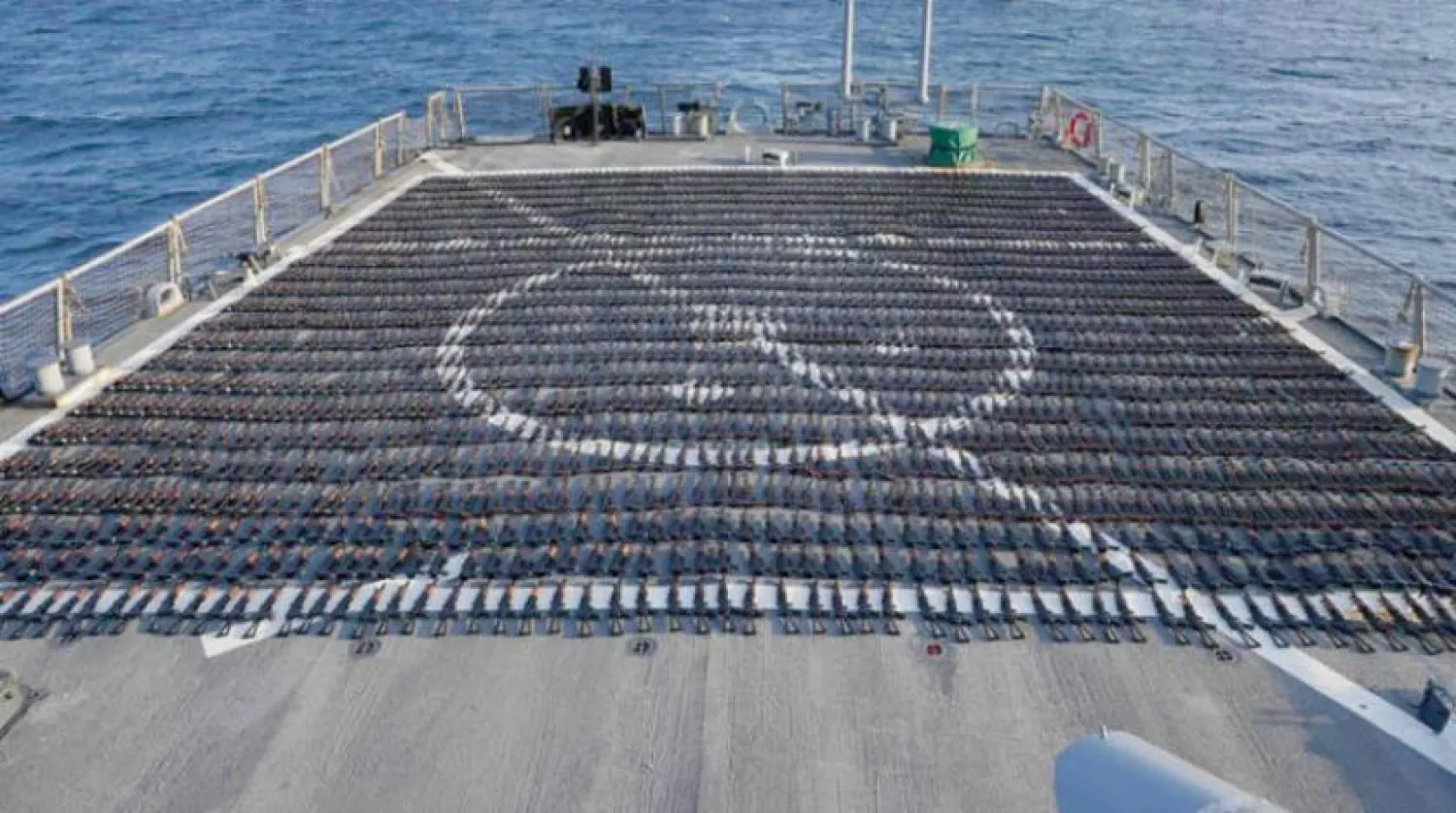The French naval special forces, along with their US and British counterparts, are now involved in combating the smuggling of Iranian weapons to the Houthi militias in Yemen, an indication of a noticeable change in France’s policy.
Paris announced that its Elite special forces seized a boatload of Iranian-supplied weapons and ammunition bound for Houthis in Yemen as part of a deepening effort to contain Tehran, according to the Wall Street Journal (WSJ), which cited officials familiar with the operation.
On Jan. 15, the officials said, a French warship stopped a suspected smuggling ship off the Yemeni coast where the specially trained French team boarded the boat.
On board, the officials said, the French military discovered more than 3,000 assault rifles, at least a half million rounds of ammunition, and over 20 antitank guided missiles.
According to the newspaper, the operation was coordinated with the US military and is "the consequence of a more proactive French role in the fight against arms smuggling in the Middle East.”
Besides the US, Britain and France have stepped up efforts to crack down on arms smuggling to the Houthis, according to the daily.
The US Navy 5th Fleet spokesman Commander, Tim Hawkins, told WSJ that in the past two months alone, they had prevented more than 5,000 weapons and 1.6 million rounds from reaching Yemen.
Last month, the US Navy intercepted weapons aboard a fishing vessel in the Gulf of Oman believed to have come from Iran and on its way to the Houthis, the third shipment to be intercepted in two months, according to the Bahrain-US Fifth Fleet.
The US naval forces announced that a fishing vessel in the Gulf of Oman on Jan. 6 was discovered smuggling 2,116 AK-47 assault rifles while transiting international waters along a maritime route from Iran to Yemen.
The statement confirmed that the naval forces seized the shipment, which was sailing on a route historically used to illicit traffic cargo to the Houthis, and was crewed by six Yemeni nationals.
In its statement, the US Navy stressed that "the direct or indirect supply, sale or transfer of weapons to the Houthis violates UN Security Council Resolution 2216 and international law. The transfer of the vessel and its crew for repatriation is in progress."
"This shipment is part of a continued pattern of destabilizing activity from Iran," said Vice Adm. Brad Cooper, commander of US Naval Forces Central Command, US 5th Fleet, and Combined Maritime Forces.
"These threats have our attention. We remain vigilant in detecting any maritime activity that impedes freedom of navigation or compromises regional security."
Last December, the US Navy intercepted two other Iranian arms shipments in the Gulf of Oman on their way to Yemen.
According to the Navy, one of the two shipments contained 50 tons of ammunition, fuses, and fuel for missiles, while the other shipment included 70 tons of ammonium perchlorate, which is usually used in the manufacture of rocket and missile fuel, as well as 100 tons of urea fertilizers.
The UN experts on Yemen indicated that there are land routes used by arms smugglers for the Houthis from the eastern border, in addition to the sea routes used by smuggling networks coming from Iran towards the Yemeni regions.
Last Tuesday, the Navy announced that the Coast Guard vessel seized illegal drugs worth a total estimated street value of $33 million from a fishing vessel transiting international waters in the Gulf of Oman.
The US statement did not indicate the shipment's destination, which included about 4,000 kilograms of hashish and 512 kilograms of methamphetamine.
"This is just the beginning of our work delivering maritime security operations in the region to stop illicit activities and drug smuggling," said UK Royal Navy Capt. James Byron, the CTF 150 commander.
"This comes as a result of a valued partnership between CTF 150 and all partner nations in Combined Maritime Forces."
In the latest statement, the Yemeni Defense Minister, Lt. Gen. Mohsen al-Daeri, accused the international community of being complacent with the Houthis.
In his meeting last Tuesday with the UN's Military Adviser, Brigadier General Antony Hayward, Daeri warned that if the international community continues to "turn a blind eye" to the "terrorist group," its actions would threaten the whole world.
He added that the legitimate army forces in his country are facing what he described as "a terrorist group that claims the divine right to rule," calling for a strong stand to restore the state and its institutions and establish peace and stability throughout Yemen.
Meanwhile, the head of the Presidential Leadership Council, Rashad al-Alimi, lauded the regional, European, US, and international efforts to bring peace to Yemen.
During a meeting with European ambassadors currently visiting Aden, Alimi asserted that the Council is that of peace, but at the same time, it is determined and strong to deter any hostile escalation.
He informed ambassadors that the Houthi militia "has not and will never be a project for desired peace in Yemen."









